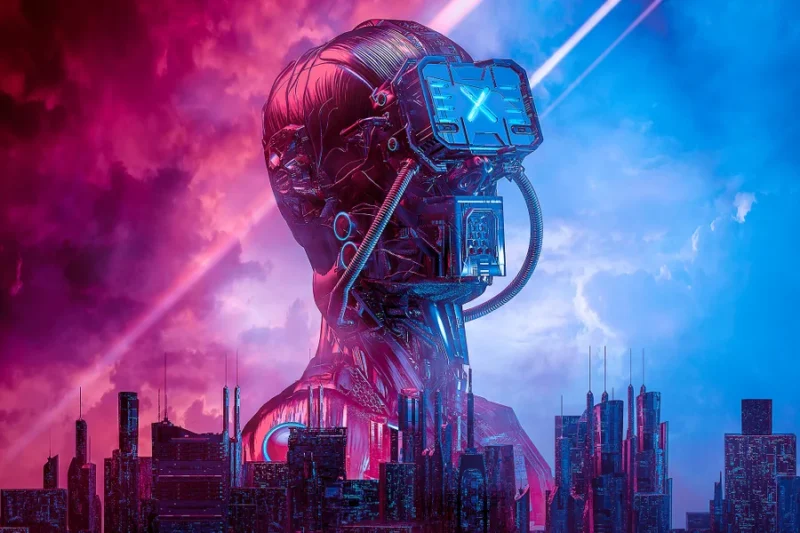[해외 DS] 공상과학 소설을 현실로 만들려는 실리콘밸리의 억만장자들
실리콘밸리 영감의 원천은 어릴적 읽은 공상과학 소설 SF 스토리의 이면엔 사회적 화합을 위협하는 세계관 만연 장르 소재 고착화 심화, 새로운 미래 제시할 상상력 부재
[해외DS]는 해외 유수의 데이터 사이언스 전문지들에서 전하는 업계 전문가들의 의견을 담았습니다. 저희 데이터 사이언스 경영 연구소 (GIAI R&D Korea)에서 영어 원문 공개 조건으로 콘텐츠 제휴가 진행 중입니다.

실리콘밸리의 억만장자들은 30~50년 전에 출간된 공상과학 소설(Science Fiction, SF)을 읽고 자랐으며 오늘날 우리 삶에 일일이 열거하기 힘들 정도로 다양한 방식으로 영향을 미치고 있다. 이들은 10대 때 읽었던 공상과학 소설과 판타지 소설에서 착안한 발명품을 실현하기 위해 총 5조 달러 이상을 투자하고 있다.
테스크리얼, SF는 과학적 상상을 넘어 이데올로기로써 작동해
일론 머스크는 화성 식민지화를 원하고, 제프 베조스는 1970년대의 지구 궤도를 도는 거대한 서식지 건설을 계획하고 있다. 피터 틸(페이팔의 창업자)은 인공지능, 생명 연장, 해상국가(Seasteading) 연구에 자금을 지원하고 있으며 마크 저커버그는 닐 스티븐슨의 소설 ‘스노 크래시’에 등장하는 메타버스를 만드는 데 100억 달러를 투자했다. 그리고 벤처 캐피털 회사인 앤드리슨 호로위츠(Andreessen Horowitz)의 마크 앤드리슨은 ‘테크노 낙관주의자 선언문’을 발표하여 규제 없는 기술 혼돈과 자본주의적 미래를 요구하는 기괴한 가속주의 철학을 홍보하고 있다.
이들의 거침 없는 행보가 우려스러운 이유는 공상과학 소설은 심오한 이데올로기적 장르로서 새로운 기기나 발명품 그 이상의 것을 다루고 있기 때문이다. 그리고 지난 세기의 공상과학과 판타지 작품에는 위험한 가정이 가득하다. 캐나다의 공상과학 소설가이자 미래학자인 칼 슈뢰더는 “모든 기술에는 암묵적인 정치적 의제가 내포되어 있다”고 말한 바 있다. 기술 기업의 금권정치는 지구상의 80억 인구에게 자신들의 의제를 강요하려는 의도가 있는 것 같다.
구글의 AI 윤리팀의 전 기술공동책임자이자 인공지능윤리연구소(DAIR)의 설립자인 팀닛 게브루와 인류에 대한 실존적 위협을 전문으로 연구하는 철학자 에밀 토레스는 이러한 부유한 기업가들을 움직이는 이데올로기에 대해 경고한 바 있다. 이들은 이 이데올로기를 ‘Transhumanism, Extropianism, Singularitarianism, Cosmism, Rationalism, Effective altruism 그리고 Longtermism’의 약자인 테스크리얼(TESCREAL)로 명명했다. 구체적으로 트랜스휴머니스트는 인간의 인지능력을 확장하고 수명을 연장하고자 하며, 엑스트로피안들은 이러한 이상에 우주 식민지화, 마인드 업로딩, 인공지능, 합리주의를 추가했다. 효과적인 이타주의와 장기주의는 모두 미래에 긍정적 영향을 주는 방향으로 현재를 투자하는 태도다. 우주 식민지, 불멸, 기술 신격화에 대한 비전을 뒷받침하는 테스크리얼은 본질적으로 실리콘밸리의 대제사장들에게 부를 안겨주기 위한 신학적 프로그램으로 볼 수 있다.
‘더불어 사는 삶’과는 거리가 먼 SF 거장들의 ‘유토피아’
오늘날의 억만장자들이 자란 공상과학 장르는 1970년대에 존재했던 발명가이자 출판업자인 휴고 건즈백(Hugo Gernsback)에게 거슬러 올라간다. 건즈백은 과학과 기술에 관한 일반 기사를 발행하다가 공상과학 소설을 발표했다. 그는 1926년 어메이징 스토리(Amazing Stories) 잡지를 발행하기 시작했는데, 이 잡지는 기술적인 미래에 대한 환상적인 이야기를 다뤘다. 그의 잡지에 실린 SF는 자본주의적 성공에 대한 아메리칸드림과 무비판적인 기술 해결주의(technological solutionism), 그리고 개척 식민주의(frontier colonialism)를 결합했다.
건즈백의 SF는 이탈리아 미래주의의 과거에 대한 거부와 속도, 기계, 폭력, 젊음, 산업에 대한 찬양을 반영했으며, 이는 모두 극우적 사고의 산물이었다. 그의 라이벌인 존 W. 캠벨 주니어(1937년부터 1971년까지 <어스타운딩 사이언스 픽션>의 편집장)는 로버트 하인라인과 아이작 아시모프 등 유명한 작가들을 발굴했으나 캠벨은 인종차별주의자이자 성차별주의자였으며 공산주의자를 탄압했다. 또한 베스트셀러 작가인 아인 랜드는 자신의 객관주의 철학과 양립할 수 있는 유일한 사회 체제는 자유방임주의 자본주의라고 역설했었다. SF 거장들의 이러한 주장들은 오늘날의 억만장자들에게 분명 매력적이다.
테스크리얼에 대한 SF의 가장 이상한 공헌은 아마도 1917년 이후 철학자 니콜라이 표도로비치 표도로프의 러시아 우주론일 것이다. 우주론은 우주 식민지에서부터 불멸론, 초인, 특이점, 마인드 업로드 등에 이르기까지 공상과학 소설에 널리 퍼져 있다. 또한 우주론은 화성에 이어 은하계를 식민지화하고, 불멸을 달성하고, 인류의 장기적 이익을 우선시하는 등 암묵적인 운명을 지닌 세속적 준종교로서 억만장자들에게 자기 부를 위한 매력적인 명분을 제공한다.
일례로 피터 틸은 소설 ‘반지의 제왕’ 속 천리안 수정구슬 ‘팔란티어’에서 회사 이름을 따 분석 회사 팔란티어 테크놀로지스(Palantir Technologies)를 공동 설립하고 최근 Atlantic과의 인터뷰에서 J.R.R. 톨킨의 엘프들처럼 불멸의 존재가 되고 싶다고 말했다. 은하계 사회주의 유토피아에 대한 이야기를 다룬 이언 뱅크스의 공상과학 시리즈에서 따온 이름을 가진 로켓 바지선(‘Just Read the Instructions’와 ‘Of Course I Still Love You’)에 로켓을 착륙시키는 일론 머스크의 모습에서 우주론의 영향을 확인할 수 있다. 테스크리얼은 또한 기독교 신학적 추론, 캠벨의 백인 우월주의, 랜드의 무자비함, 1980년대까지 이 장르에 만연했던 우생학, 우주를 식민지화하려는 제국주의적 사상으로 심하게 오염되어 있다.
SF 장르의 혁신 부재, 방향성을 잃은 억만장자들의 도전정신
지금의 SF 작가들은 이전 세대의 공상과학 작가들에 의해 무엇을 기대해야 하는지 훈련된 청중을 즐겁게 하기 위해 노력하고 있다. 아울러 작가들은 미래를 정확하게 예측하는 것이 아니라 생계를 유지하기 위해 노력한다. 어떤 예지력도 철저히 우연에 불과하고, 기존의 소재를 재활용하며, 이전 작가와 독자들의 편견에 크게 영향을 받는다.
그 결과 SF 장르는 이전 대규모언어모델(LLM)에 의해 심하게 오염된 텍스트를 사용하여 재학습된 현재의 LLM과 매우 유사하게 작동하며, 전작과 유사한 소재를 배출하는 경향이 자리 잡았다. 기존의 통념을 깨거나 의문을 제기하기보다는 해당 분야의 역사를 반영한다는 점에서 소소하고 보수적인 장르로 전락했다. 인기 연예인들이 더 많은 청중을 끌어들이기 위해 팬덤을 형성하여 발전하는 것처럼 이 분야도 현재 그렇게 발전하고 있다.
2021년에는 작가이자 게임 디자이너인 알렉스 블레크먼의 트윗을 기반으로 한 밈이 생겨났다(나중에 마스토돈에 게시됨):
공상과학 작가: 제 책에서 저는 경고의 의미로 고통의 넥서스를 발명했습니다.
기술 회사: 마침내 고전 공상과학 소설 <고통의 넥서스를 만들지 말라>에 나오는 고통의 넥서스를 만들었습니다.
위 트윗은 현재 실리콘밸리의 상황을 걱정스러울 정도로 정확하게 담아냈다. 운전대를 잡은 억만장자들은 경고를 오락으로 착각하고, 우리는 조수석에 갇혀 있다. 우리 앞에 절벽이 없기를 바랄 뿐이다.
Tech Billionaires Need to Stop Trying to Make the Science Fiction They Grew Up on Real
Today’s Silicon Valley billionaires grew up reading classic American science fiction. Now they’re trying to make it come true, embodying a dangerous political outlook
Science fiction (SF) influences everything in this day and age, from the design of everyday artifacts to how we—including the current crop of 50-something Silicon Valley billionaires—work. And that’s a bad thing: it leaves us facing a future we were all warned about, courtesy of dystopian novels mistaken for instruction manuals.
Billionaires who grew up reading science-fiction classics published 30 to 50 years ago are affecting our life today in almost too many ways to list: Elon Musk wants to colonize Mars. Jeff Bezos prefers 1970s plans for giant orbital habitats. Peter Thiel is funding research into artificial intelligence, life extension and “seasteading.” Mark Zuckerberg has blown $10 billion trying to create the Metaverse from Neal Stephenson’s novel Snow Crash. And Marc Andreessen of the venture capital firm Andreessen Horowitz has published a “techno-optimist manifesto” promoting a bizarre accelerationist philosophy that calls for an unregulated, solely capitalist future of pure technological chaos.
These men collectively have more than half a trillion dollars to spend on their quest to realize inventions culled from the science fiction and fantasy stories that they read in their teens. But this is tremendously bad news because the past century’s science fiction and fantasy works widely come loaded with dangerous assumptions.
SF is a profoundly ideological genre—it’s about much more than new gadgets or inventions. Canadian science-fiction novelist and futurist Karl Schroeder has told me that “every technology comes with an implied political agenda.” And the tech plutocracy seems intent on imposing its agenda on our planet’s eight billion inhabitants.
We were warned about the ideology driving these wealthy entrepreneurs by Timnit Gebru, former technical co-lead of the ethical artificial intelligence team at Google and founder of the Distributed Artificial Intelligence Research Institute (DAIR), and Émile Torres, a philosopher specializing in existential threats to humanity. They named this ideology TESCREAL, which stands for “transhumanism, extropianism, singularitarianism, cosmism, rationalism, effective altruism and longtermism.” These are separate but overlapping beliefs in the circles associated with big tech in California. Transhumanists seek to extend human cognition and enhance longevity; extropians add space colonization, mind uploading, AI and rationalism (narrowly defined) to these ideals. Effective altruism and longtermism both discount relieving present-day suffering to fund a better tomorrow centuries hence. Underpinning visions of space colonies, immortality and technological apotheosis, TESCREAL is essentially a theological program, one meant to festoon its high priests with riches.
How did this ideology come about, and why do I think it’s dangerous?
The science-fiction genre that today’s billionaires grew up with—the one that existed in the 1970s—goes back to inventor and publisher Hugo Gernsback. Gernsback published general articles about science and technology and then fiction in that vein. He started publishing Amazing Stories magazine in 1926 as a vehicle for fantastic tales about a technological future. His magazine’s strain of SF promoted the combination of the American dream of capitalist success, combined with uncritical technological solutionism and a side order of frontier colonialism.
Gernsbackian SF mirrored Italian futurism’s rejection of the past and celebration of speed, machinery, violence, youth and industry, and both were wide open to far-right thought. Gernsback’s rival, John W. Campbell, Jr. (editor of Astounding Science Fiction from 1937 until 1971), promoted many now famous authors, including Robert Heinlein and Isaac Asimov. But Campbell was also racist, sexist and a red-baiter. Nor was Campbell alone on the right wing of SF: for example, bestselling author Ayn Rand held that the only social system compatible with her philosophy of objectivism was laissez-faire capitalism. The appeal this holds for today’s billionaires is obvious.
Perhaps SF’s weirdest contribution to TESCREAL is Russian cosmism, the post-1917 stepchild of the mystical theological speculation of philosopher Nikolai Fyodorovich Fyodorov. It’s pervasive in science fiction—seen in topics from space colonization to immortalism, superhumans, the singularity, mind uploading, and more.
Cosmism’s contribution to the TESCREAL ideology is a secular quasi-religion with an implied destiny—colonize Mars and then the galaxy, achieve immortality, prioritize the long-term interests of humanity—that provides billionaires with an appealing justification for self-enrichment. We can see this with Thiel, who co-founded analytics company Palantir Technologies with a Lord of the Rings–themed name and recently told the Atlantic that he wanted to be immortal like J.R.R. Tolkien’s elves. And we can see it when Musk lands his rockets on barges with names taken from a science-fiction series by Iain M. Banks (ironically enough, one about a galactic socialist utopia). TESCREAL is also heavily contaminated with Christian theological reasoning, Campbellian white supremacism, Randian ruthlessness, the eugenics that was pervasive in the genre until the 1980s and the imperialist subtext of colonizing the universe.
But there is a problem: SF authors such as myself are popular entertainers who work to amuse an audience that is trained on what to expect by previous generations of science-fiction authors. We are not trying to accurately predict possible futures but to earn a living: any foresight is strictly coincidental. We recycle the existing material—and the result is influenced heavily by the biases of earlier writers and readers. The genre operates a lot like a large language model that is trained using a body of text heavily contaminated by previous LLMs; it tends to emit material like that of its predecessors. Most SF is small-c conservative insofar as it reflects the history of the field rather than trying to break ground or question received wisdom.
Science fiction, therefore, does not develop in accordance with the scientific method. It develops by popular entertainers trying to attract a bigger audience by pandering to them. The audience today includes billionaires who read science fiction in their childhood and who appear unaware of the ideological underpinnings of their youthful entertainment: elitism, “scientific” racism, eugenics, fascism and a blithe belief today in technology as the solution to societal problems.
In 2021 a meme arose based on writer and game designer Alex Blechman’s tweet about this issue (which was later posted to Mastodon):
Sci-Fi Author: In my book I invented the Torment Nexus as a cautionary tale
Tech Company: At long last, we have created the Torment Nexus from classic sci-fi novel Don’t Create The Torment Nexus
It’s a worryingly accurate summary of the situation in Silicon Valley right now: the billionaires behind the steering wheel have mistaken cautionary tales and entertainments for a road map, and we’re trapped in the passenger seat. Let’s hope there isn’t a cliff in front of us.
This is an opinion and analysis article, and the views expressed by the author or authors are not necessarily those of Scientific American.



![[해외 DS] 인공지능 채용 서비스, 누구를 위한 것인가?](https://kr.giai.org/wp-content/uploads/sites/3/2024/04/AI_recruiters-768x512.webp)
![[해외 DS] 엔비디아와 조지아공대, 학생들을 위한 AI 슈퍼컴퓨터 허브 구축](https://kr.giai.org/wp-content/uploads/sites/3/2024/04/Nvidia_GeorgiaTech_AI_MakerSpace_20240416-768x512.jpg)
![[해외 DS] 자율주행 안전성, 기술 개발과 규제 강화의 균형 필요](https://kr.giai.org/wp-content/uploads/sites/3/2024/01/Smarter_driverless_regulations_ScientificAmerican_20240109-768x512.webp)
![[해외 DS] 10년의 연구, 휴먼 브레인 프로젝트의 명과 암 (2)](https://kr.giai.org/wp-content/uploads/sites/3/스크린샷-2023-09-06-152849-768x509.png)
![[해외 DS] 검색엔진, 가짜뉴스에 대한 믿음 증폭시켜 (2)](https://kr.giai.org/wp-content/uploads/sites/3/2023/12/search_engine_is_still_vulnerable_to_fake_news-768x512.jpeg)
![[해외 DS] 인공지능 일기예보, “아직은 인간을 대체할 수 없어”](https://kr.giai.org/wp-content/uploads/sites/3/2024/01/AI_weather_forecasting_ScientificAmerican_20240110-768x512.webp)